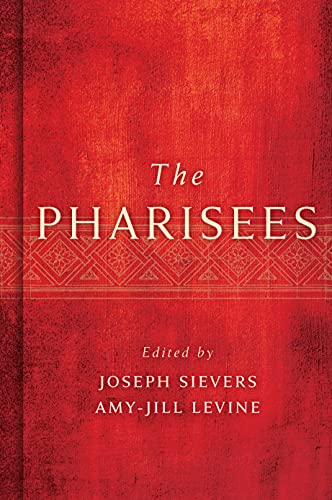The Pharisees Hardcover – December 2, 2021 by Joseph Sievers
Hardcover
[506 Pages]
PUB :December 02, 2021
Description
Author: Sievers Joseph
Edition: Annotated
Package Dimensions: 38x231x862
Number Of Pages: 506
Release Date: 02-12-2021
Details: Product Description
A multidisciplinary appraisal of the Pharisees: who they were, what they taught, and how they’ve been understood and depicted throughout history
For centuries, Pharisees have been well known but little understood—due at least in part to their outsized role in the Christian imagination arising from select negative stereotypes based in part on the Gospels. Yet historians see Pharisees as respected teachers and forward-thinking innovators who helped make the Jewish tradition more adaptable to changing circumstances and more egalitarian in practice. Seeking to bridge this gap, the contributors to this volume provide a multidisciplinary appraisal of who the Pharisees actually were, what they believed and taught, and how they have been depicted throughout history.
The topics explored within this authoritative resource include:
the origins of the Pharisees
the meaning of the name “Pharisee”
Pharisaic leniency, relative to the temple priesthood, in judicial matters
Pharisaic concerns for the Jewish laity
Pharisaic purity practices and why they became popular
the varying depictions of Pharisaic practices and beliefs in the New Testament
Jesus’s relationship to the Pharisees
the apostle Paul and his situation within the Pharisaic tradition
the question of continuity between the Pharisaic tradition and Rabbinic Judaism
the reception history of the Pharisees, including among the rabbis, the church fathers, Rashi, Maimonides, Luther, and Calvin
the failures of past scholarship to deal justly with the Pharisees
the representations, both positive and negative, of the Pharisees in art, film, passion plays, and Christian educational resources
how Christian leaders can and should address the Pharisees in sermons and in Bible studies
Following the exploration of these and other topics by a team of internationally renowned scholars, this volume concludes with an address by Pope Francis on correcting the negative stereotypes of Pharisees that have led to antisemitic prejudices and finding resources that “will positively contribute to the relationship between Jews and Christians, in view of an ever more profound and fraternal dialogue.”Contributors:
Luca Angelelli, Harold W. Attridge, Vasile Babota, Shaye J. D. Cohen, Philip A. Cunningham, Deborah Forger, Paula Fredriksen, Yair Furstenburg, Massimo Grilli, Susannah Heschel, Angela La Delfa, Amy-Jill Levine, Hermut Löhr, Steve Mason, Eric M. Meyers, Craig E. Morrison, Vered Noam, Henry Pattarumadathil, Adele Reinhartz, Jens Schröter, Joseph Sievers, Matthias Skeb, Abraham Skorka, Günter Stemberger, Christian Stückl, Adela Yarbro Collins, and Randall Zachman.
Review
“This volume provides an authoritative and comprehensive update on the Pharisees. The articles, written by leading scholars, consider the Pharisees including their reception history and legacy up to the present from multiple perspectives, based on careful analyses of diverse sources such as the Qumran scrolls, Josephus, the New Testament, rabbinic literature, and Christian writers. Written in a manner that is accessible to specialists and non-specialists alike, this volume should be considered an essential resource on the Pharisees.”
— Jodi Magness
University of North Carolina at Chapel Hill
“Tackling the caricatures of the Pharisees deeply embedded in contemporary Christian misunderstanding of ancient Judaism is no easy task. Sievers and Levine are to be warmly congratulated on bringing together a remarkable multidisciplinary array of scholars not only to dispel myths about the role of the Pharisees in Jewish society in the time of Jesus but also to explore the role of those myths in Jewish-Christian relations over the centuries down to the present. This book will enlighten many and deserves to have an impact on a wide readership.”
— Martin Goodman
University of Oxford
“The 1974 Nostra Aetate Guidelines issued by the Vatican’s Commission for Religious Relations with the Jews warn against the pejorative u
Be the first to review “The Pharisees Hardcover – December 2, 2021 by Joseph Sievers”
You must be <a href="https://webdelico.com/my-account/">logged in</a> to post a review.




























There are no reviews yet.